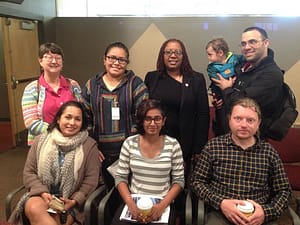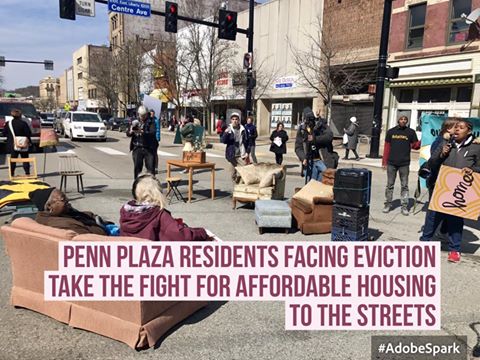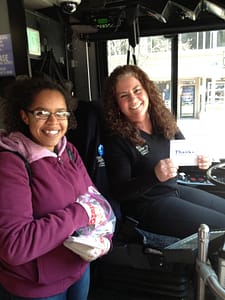PPT was recently referenced in a New York Times article about Pittsburgh’s relationship to Uber.
from the article:
In January, Pittsburghers for Public Transit, a nonprofit representing bus drivers and riders, organized a #DeleteUber social media campaign and a street demonstration against the company’s decision to continue airport service when taxi drivers had halted rides to protest the Trump administration’s travel ban.
Molly Nichols, executive director of the group, said Uber had called to ask her to cancel the protest, which ultimately went ahead.
“The warning signs about Uber’s questionable business practices were all over the place, and the mayor should have recognized that and worked harder to create a partnership that was more equitable,” Ms. Nichols said.
She added that there might be longer-term problems from autonomous vehicles, including automation’s effect on Uber’s 4,000 drivers in the city. Parking fees also make up about 15 percent of Pittsburgh’s revenue, and the city has not said how those funds would be replaced if fewer people owned and parked cars and used driverless services instead, she said.”
—
Representatives from PPT, ATU Local 85, and One PA had met with Mayor Peduto in April, and we shared various requests (see below). The Mayor was receptive and invited us to be part of the conversation about how to craft a “social contract” with private autonomous vehicle companies. If you’d like to be involved in this campaign, email: info@pittsburghforpublictransit.org
4.11.17
Dear Mayor Peduto,
In February, Uber CEO Travis Kalanick’s role on the Trump Economic Advisory Council and the company’s questionable response to the travel ban and to the subsequent NY Taxi Alliance drivers’ strike provoked serious concern about Uber’s role in our city. And in just this last month since the Pittsburgh Uber protest, allegations of pervasive sexual harassment of female engineers on the job and Kalanick’s own shameful treatment of drivers have surfaced. These issues are themselves enough to warrant serious reexamination about Uber’s relationship to Pittsburgh. However, we have additional on-going concerns about the company’s business practices and their harmful impacts on workers, riders, taxpayers and our city.
Uber does not disclose the data it is gathering around automated vehicles including safety information; they have flaunted state regulations and oversight in Pennsylvania and elsewhere, and have failed to pay fines owed; they continue to use public infrastructure without substantive financial return for the city; they allege that they have no driver “employees” and so they offer no employee benefits nor are drivers allowed to organize; their plans for automating vehicles will result in massive job losses of their own driver “partners” and good county transit worker jobs; and there are no just transition plans in place. These are just a few of a much larger list of problematic business practices at Uber that have been exposed in recent months.
We appreciate that you have been voicing similar concerns about the company, and that “if they are going to be involved in economic disruption, they have a moral obligation to society,” as you stated to the Pittsburgh Post-Gazette. We agree that it is appropriate and necessary to require that Uber be made to comply with several demands in exchange for their use of Pittsburgh public infrastructure. We suggest that Uber be required to:
- Open source their data and algorithms
- Share profit with the City from any sale of autonomous vehicle technology
- Make it a condition of any autonomous vehicle technology sale that manufacturing of autonomous vehicle parts must be done in Pittsburgh
- Create a democratically-controlled just transition fund for their drivers and other jobs that they will be displacing.
In addition, as taxpayers and concerned constituents, we are asking for the City to do the following:
- Disclose the full extent of Uber’s relationship with the City and County.
- Reveal all public resources being provided to the company, (for example, tax incentives, use of public roadways, etc.)
- Analyze the possible impact of automated vehicle technology to the workforce, to traffic and congestion, to the environment, and public transit ridership.
- Analyze the possible loss of City revenue from parking from automated vehicle technology.
- Create a publicly-owned fund for workers and city/county residents that is produced by taxation on increased productivity from autonomous vehicles.
- Evaluate publicly-owned and operated, unionized, accessible, equitable on-demand transit service options.
Pittsburgh was at a similar juncture 40 years ago with the automation of the steel industry; we have an opportunity with the benefit of hindsight to plan instead for a positive transition. A March 12th Post-Gazette article about the driverless future highlights some critical concerns: “‘Left unregulated, the popularity and affordability of driverless cars may have the opposite effect for cities by increasing congestion, encouraging sprawl and exacerbating growing inequalities,’ said Peter Glus of Arcadis in a statement. ‘Additionally, public agencies may face lower transit ridership, resulting in lost revenues from transit tickets, parking fees, traffic fines, and other once-reliable revenue sources.’ The rise of autonomous vehicles could also lead to greater unemployment among professional drivers while those with limited access to technology may not be able to take advantage of the services.”
We look forward to having a productive conversation about how we can ensure that decisions about our transportation systems equitably serve the residents of our City.
Sincerely,
Laura Wiens, aurallaura@gmail.com, Pittsburghers for Public Transit
Erin Kramer, erin@onepa.org, One Pennsylvania
Tom Conroy, tomconroy@hotmail.com, Amalgamated Transit Union Local 85





 Picture: Penn Plaza residents set up living room at intersection
Picture: Penn Plaza residents set up living room at intersection

